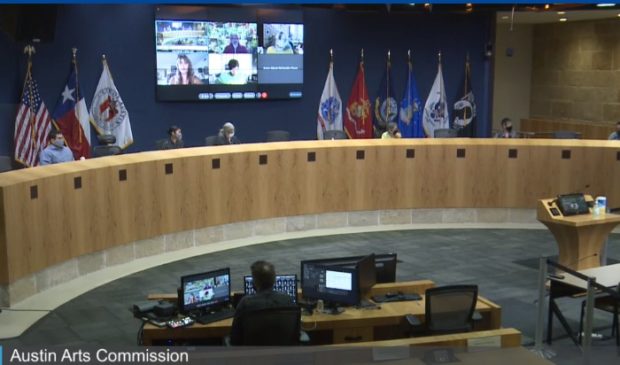Arts Commission decides on Covid relief funds, hears concerns on equitable contract funding
Monday, September 27, 2021 by
Chad Swiatecki The Arts Commission has given City Council its recommendations for how best to use federal Covid-19 relief dollars planned for creative arts organizations before the end of the year, with staff still examining how to restructure hotel tax-funded contracts and programs for next year.
At last week’s meeting, the commission voted unanimously to have the $5.4 million available for arts organizations directed to current contractors in the Core and Cultural Heritage Festivals categories.
Of those groups, those that have received less than $10,000 in other Covid relief programs will receive the entire amount stipulated in their contract for the 2021 fiscal year. Groups that have already received between $10,000 and $1 million from other relief programs will receive 85 percent of their contracted amount.
That framework leaves $200,000 available from the federal allocation, which can be used “as needed for adjustments or other emergency funding programs that can serve other small organizations or individuals not covered in this funding proposal recommendation.”
At that same meeting, staffers reported that early negative feedback from the public on a plan to restructure how Cultural Arts contracts are awarded in the future – with an emphasis on increasing equitable funding – has resulted in an extension to allow the community to give more input.
The plan to redistribute funding also comes in a year when the amount of contract funding for arts groups is severely reduced overall because of the drastic reduction in Hotel Occupancy Tax revenue due to the Covid-19 pandemic.
That combination means some longtime recipients of city arts contracts could be shut out or receive far less funding than in typical years, with some perceiving the equity focus as shutting out white-led groups.
Meghan Wells, manager of the Cultural Arts Division, said those hotel tax-funded programs were expected to launch in the spring, but have been pushed back because of concerns over the possibility of a third-party program administrator costing too much from the award pool.
Amid a variety of concerns about the equity emphasis and how it is being decided, Wells said at a City Council committee meeting last week that staff members are dedicated to moving forward with the restructuring this year.
Commissioners took a variety of positions on the perception of white-led groups being shut out of future cultural contracts, ranging from frustration over the lack of involvement from those circles to pushing for understanding on how legacy arts groups will be impacted by severe funding cuts.
“The question of ‘Why are white-led organizations being left out’ – that’s a troublesome question. When we’re talking about equity we’re talking about the whole community and leading with racial equity, so that doesn’t exclude anyone,” Commissioner Jaime Castillo said. “To start asking why white-led organizations are being left out when they’re not being left out … the conversation is about everybody. I want to challenge the community to look in the mirror, and dig deep because we’ve been talking about this for years.”
Commissioner Amy Mok said all arts groups are welcome to work with the commission and the city to discuss the future of cultural contracts, including when hotel tax revenue returns to previous levels and the amounts received by contractors will increase.
“We actually welcome white-led organizations to help us find a solution. What is your role in addressing equity? I think it’s the only role you can play because you have benefited from this inequitable system for years and years and years,” she said. “People of color in this community were not at the table for the past 50 years and you were there, so we want you to be part of the solution.”
Chair Michelle Polgar thanked Wells and division staff for taking in the community’s feedback and working toward equitable funding while receiving frequent criticism.
“I understand where that question comes from because I’ve heard that exact question phrased in that exact way from members of this community. The point staff have been making in this moment is, this is what we’re hearing, and we’re repeating it back to you … the good, the bad and the ugly,” she said.
The Austin Monitor’s work is made possible by donations from the community. Though our reporting covers donors from time to time, we are careful to keep business and editorial efforts separate while maintaining transparency. A complete list of donors is available here, and our code of ethics is explained here.
You're a community leader
And we’re honored you look to us for serious, in-depth news. You know a strong community needs local and dedicated watchdog reporting. We’re here for you and that won’t change. Now will you take the powerful next step and support our nonprofit news organization?






